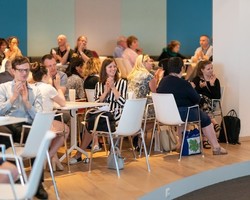RHN annual meeting focuses on keeping people at the heart of policy on health and sustainable development

Peter Müllenberg/Photostique
How can the subnational level contribute to keeping people at the heart of policy on health and sustainable development?
The 25th annual meeting of the WHO Regions for Health Network (RHN), which took place in the Meuse-Rhine Euroregion (EMR) on 26–28 June 2019, offered a high-level platform for sharing best practice in addressing this topic in the WHO European Region. The event brought together almost 200 participants from 28 countries.
Intersected by the waters of the Meuse and Rhine Rivers, and comprising more than 4 million people living in 5 regions of Belgium, Germany, and the Netherlands, EMR provided a unique opportunity to exchange ideas in a transborder environment with a historical context of diversity and integration. The venues selected were Aachen (Germany), the homeland of Charlemagne (pater Europae), Maastricht (Netherlands), where the Treaty on European Union was signed, and Liege and Hasselt (Belgium), two cities with outstanding models of urban regeneration sites, all of which provided perfect examples of how the integration of social policy and cross-border cooperation in health care became a reality.
The following snapshot illustrates the highlights of the meeting.
- During the plenary sessions, the participants were updated about developments related to some of the most pressing issues in the WHO European Region, including measures taken to address health and health-system inequities and inspire and scale up action towards achievement of the Sustainable Development Goals;
- Sessions held at the Coronation Hall in Aachen, the Provincial House in Maastricht and the Cité Miroir in Liège showcased institutional strategies and best practice in the Region. Three of the successful case studies presented provided information about the micro-areas project on promoting health in low-income areas in Friuli Venezia Giulia (Italy), the policies resulting from the Well-being of Future Generations (Wales) Act of 2015, and the cross-border project on the collection of data to compare health status in EMR.
- In World Café style, discussions buzzed around prominent subregional issues, such as health inequities, environment and health, and human resources for health. A 3-hour Maastricht–Liege cruise allowed the regions to network and share their experiences in tackling these issues.
- Participatory approaches took the forefront with news from the Citizen Summits held in Aachen (Germany), and Eupen (Belgium) in February 2019. This included a presentation on new methodological tools for use in better capturing quality of life and citizens' opinions on equity and sustainable development. Citizens’ views, an often underrepresented component in health and heath-care-system policies, were highlighted as being critical to improving accountability for and ensuring consistency with community-health needs.
A new RHN publication on the Flanders Primary Care Reform and other experiences was launched during the meeting. It provides a helpful insight on the enablers of the reform, as well as on the obstacles and challenges related to improving population health at the local and community levels that were overcome through careful planning and sustained engagement across society.
The meeting closed with the sense that the 41 regions across 28 countries in the WHO European Region are well equipped and on the right path to addressing the challenges they are facing in today’s world.
The event was organized by the WHO European Centre for Investment for Health and Development in collaboration with the European Committee of the Regions and EMR.



